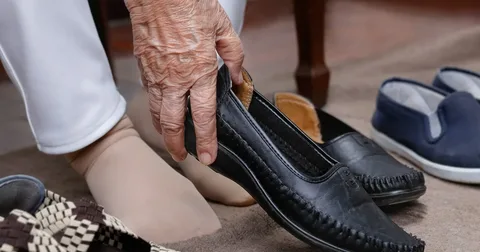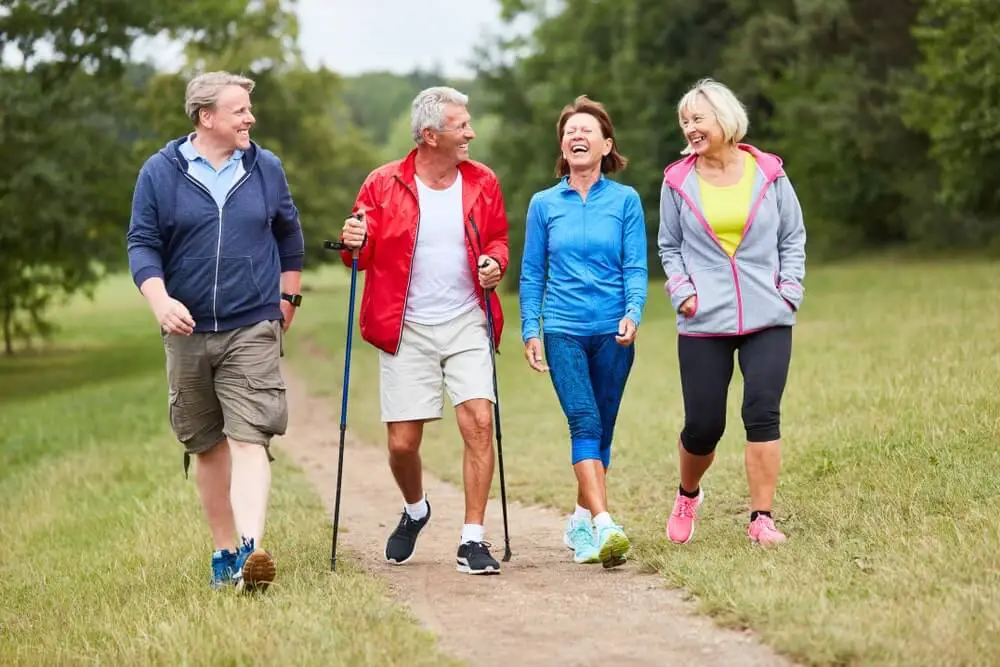As we age, our feet often take a beating, and taking care of them is essential for elderly foot health. Adaptive shoes for elderly offer numerous advantages that can help keep feet comfortable and safe. From providing stability and support to helping prevent falls and injuries, adaptive shoes are a must-have for elderly people who want to maintain their mobility and independence.
Increased Mobility and Comfort
As you age, your feet undergo a lot of wear and tear, making it difficult to move around comfortably. That’s where adaptive shoes come in handy. They are designed to provide superior comfort and support, making walking and moving around easier and more comfortable for the elderly.
Adaptive shoes feature a variety of design elements that increase mobility and comfort, such as adjustable straps and easy-to-use closures. These features allow for a customized fit, reducing the chances of discomfort and pain. Additionally, adaptive shoes often come with cushioned insoles and extra padding, which can help alleviate pressure on sensitive areas of the foot.
For the elderly, who may suffer from arthritis, plantar fasciitis, or other foot conditions, adaptive shoes are a lifesaver. The unique design elements cater to a wide range of foot issues, ensuring that the wearer experiences a significant improvement in mobility and comfort. Adaptive shoes can also provide extra stability, helping to prevent falls and injuries. With their slip-resistant soles, adaptive shoes can keep the elderly safe while they move around their homes or outdoors.
Improved Comfort and Support
One of the most important reasons why elderly individuals should consider using adaptive shoes is the improved comfort and support that these shoes provide. As individuals age, their feet may undergo a variety of changes that can impact the comfort of their shoes, including changes in size, shape, and the presence of foot conditions.
Adaptive shoes are specifically designed to provide additional cushioning, arch support, and shock absorption, which can help reduce discomfort and pain associated with common foot problems such as bunions, arthritis, and plantar fasciitis. The added support can also help prevent injuries and falls, which can be especially important for those with balance or mobility issues.
Additionally, adaptive shoes often feature a wider toe box, which allows for increased room for swollen or deformed toes, as well as adjustable straps or closures that can accommodate foot swelling throughout the day. These features not only provide greater comfort but also ensure a more secure and snug fit.
Best Lightweight Walking Shoes for Elderly Accommodates Foot Conditions
Adaptive shoes for the elderly come in different designs that cater to various foot conditions such as bunions, hammertoes, flat feet, and more. Many older adults suffer from these issues, which can lead to discomfort, difficulty walking, and even falls. When looking for the best lightweight walking shoes for elderly adults, it is important to consider features such as wide widths, adjustable straps, and slip-resistant soles.
Additionally, shoes that have removable insoles can also be helpful for those who use custom orthotics or have swelling in their feet. Fortunately, adaptive shoes address these problems by providing the necessary support, cushioning, and flexibility that each condition demands.
One of the best types of adaptive shoes for the elderly is the lightweight walking shoe. These shoes are designed to be easy on the feet, with soft cushioning, shock-absorbing soles, and breathable materials. They are perfect for seniors who need comfortable, durable shoes that will enable them to move around freely and safely.
By wearing adaptive shoes that accommodate their foot conditions, seniors can enjoy a better quality of life, free from foot pain, and discomfort. These shoes not only enhance their mobility but also promote healthy foot function and reduce the risk of falls and other accidents.
Durable and Long-Lasting
When it comes to choosing shoes for the elderly, durability and longevity are important factors to consider. Adaptive shoes are designed to last, and the materials used in their construction are selected specifically for their ability to withstand daily wear and tear. This makes them a wise investment for seniors who need reliable, comfortable footwear.
Many adaptive shoes feature reinforced soles and high-quality materials that help to prevent excessive wear and tear. It not only ensures that they last longer, but it also helps to provide support and cushioning to the foot, which can be especially important for those with arthritis or other foot conditions.
Some of the materials used in adaptive shoes include leather, mesh, and other durable synthetic materials that can withstand the test of time. These shoes also often feature reinforced stitching and high-quality laces that help to keep the shoe intact and provide a snug, comfortable fit. Choosing adaptive shoes for the elderly can provide them with a durable and long-lasting footwear solution that will help them to maintain mobility and comfort for years to come.
Safer and More Stable Footing with the Best Shoes for Elderly
One of the biggest concerns for the elderly is the risk of falls, which can result in serious injuries such as broken bones or head trauma. The use of adaptive shoes can help reduce the risk of falls and provide a more stable footing for the elderly. Investing in the best shoes for elderly can provide the safety, stability, and confidence needed for the elderly to continue living their lives with ease and comfort.
Adaptive shoes often have non-slip soles that provide traction and grip on various surfaces. It can be particularly beneficial for those who have difficulty walking or standing for extended periods. Additionally, adaptive shoes may feature wider soles and heel cups that help distribute weight more evenly, providing additional stability.
Many adaptive shoes also have adjustable closures such as Velcro straps or elastic laces, which can provide a customized fit and prevent the shoe from slipping off. It can be especially helpful for those with mobility or dexterity issues. By wearing adaptive shoes, the elderly can improve their confidence in walking and reduce their fear of falling. It, in turn, can lead to an increase in physical activity and overall well-being.
Easy to Put on and Take off
As people age, they often experience physical limitations that make it difficult to bend down and put on shoes or tie laces. It can make even simple tasks like going for a walk a challenge. Adaptive shoes are designed to make this process easier, offering features like slip-on designs and adjustable closures that make them easy to put on and take off.
Slip-on shoes eliminate the need to bend down to put them on, reducing strain on the back and joints. They can also help seniors who have trouble with fine motor skills or dexterity, such as those with arthritis or Parkinson’s disease. Shoes with adjustable closures, like Velcro straps or buckles, can accommodate different foot shapes and sizes, and can be tightened or loosened as needed.
Easy-to-use shoes also provide more independence for seniors who may have to rely on others for help with dressing. Being able to put on and take off shoes themselves can help boost confidence and self-esteem.
Promotes Proper Posture
As you age, your body goes through several changes, including posture. Many elderly individuals tend to develop a stooped posture due to weakened muscles and bones. Poor posture can lead to aches and pains, difficulty breathing, and a higher risk of falls.
Thankfully, adaptive shoes can promote proper posture, which is essential for elderly foot care. These shoes are designed to provide support and stability to the feet, keeping the body aligned and reducing the risk of falls. With the right shoes, the body can maintain proper balance, posture, and gait.
Many adaptive shoes come with special features like contoured foot beds and arch support that help align the spine, reducing the pressure on the joints. The shoes’ comfortable fit also helps alleviate any pain or discomfort caused by standing or walking for extended periods. Wearing adaptive shoes can help seniors stay active, which is crucial for maintaining a healthy lifestyle. Regular exercise, even walking, can improve cardiovascular health, balance, and flexibility.
FAQS
Q: What Makes Adaptive Shoes for Elderly Different from Regular Shoes?
A: Adaptive shoes are designed with features that cater specifically to the needs of the elderly. They are easy to put on and take off, provide increased support and comfort, and often have slip-resistant soles for better stability.
Q: Can Adaptive Shoes Accommodate Different Foot Conditions?
A: Yes, adaptive shoes are designed to accommodate a wide range of foot conditions. They may have features such as extra depth, wide widths, or adjustable closures to cater to specific needs.
Q: Do Adaptive Shoes Come in Stylish Designs?
A: Yes, many adaptive shoe brands offer stylish designs that cater to different tastes and preferences. From classic styles to trendy options, there are options to suit any style.
Conclusion
Adaptive shoes are an excellent investment for the elderly because they can help alleviate common foot problems, provide stability, and offer enhanced mobility. With the right pair of shoes, seniors can enjoy an active lifestyle without worrying about slips, trips, and falls.



